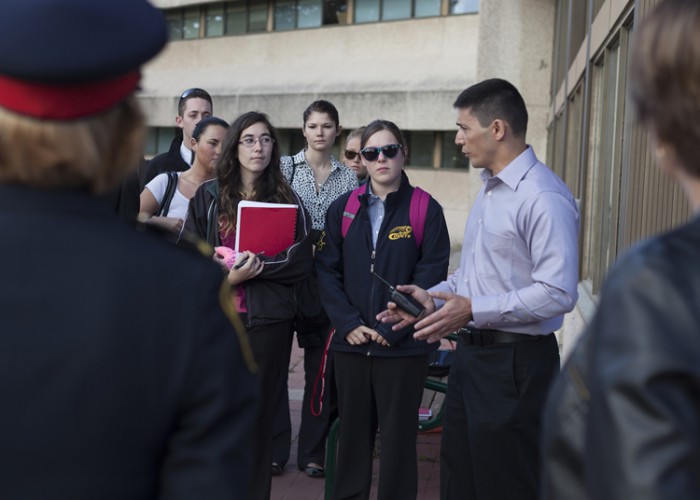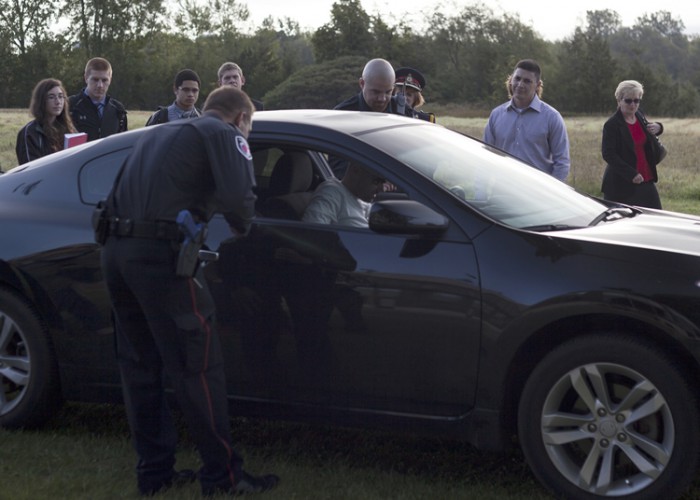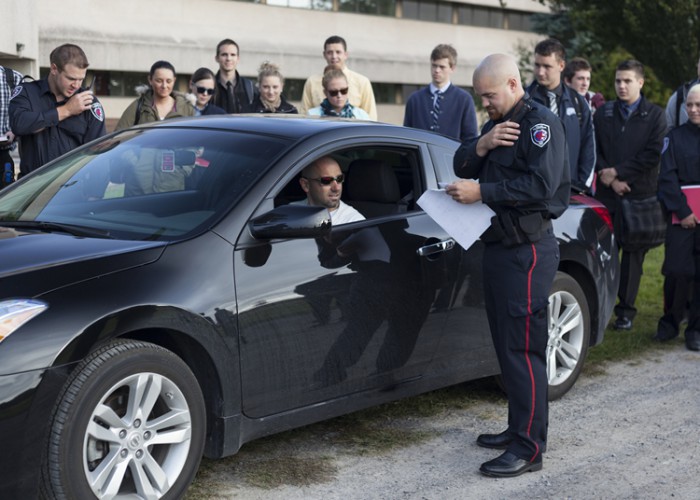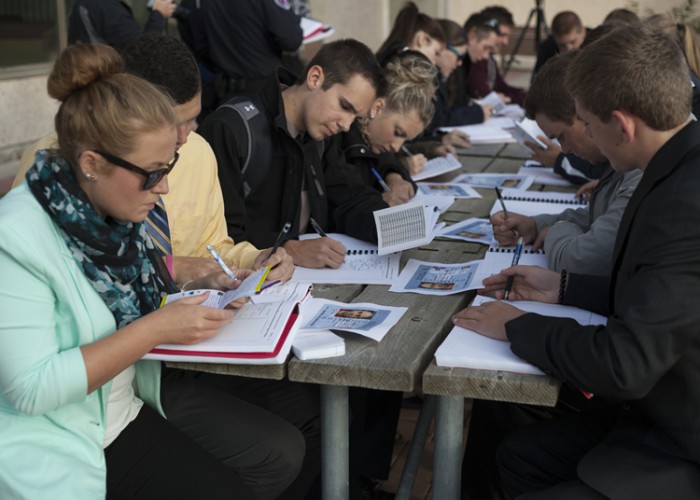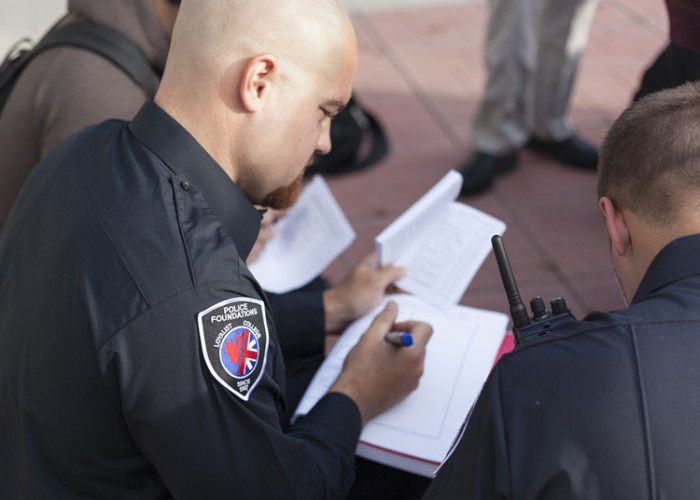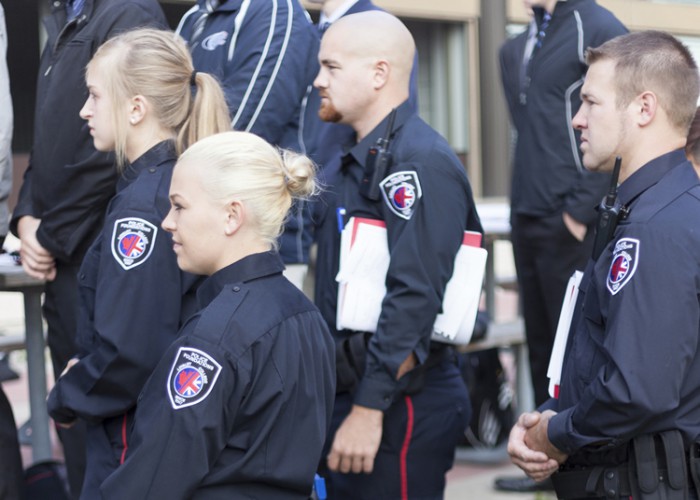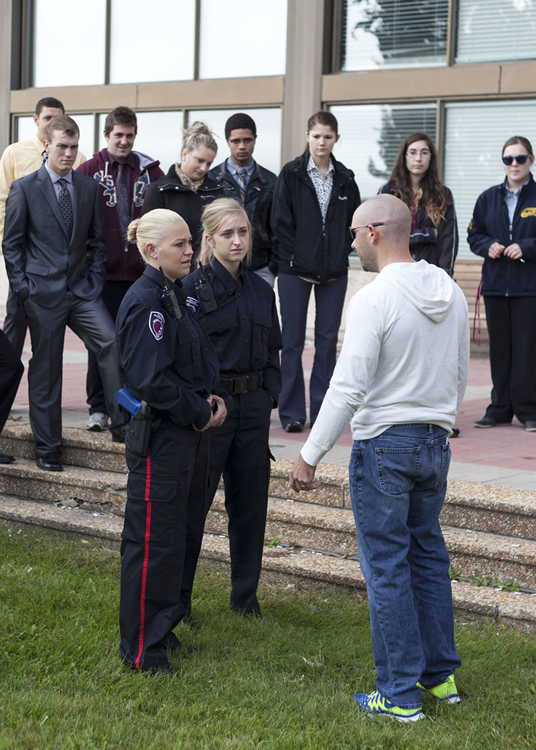Police Foundations
Available as a two-year program
- Credential
Two-year Ontario College Diploma
- Start Date
September and January entry
- Location
Belleville campus
Find your career
- There are a broad range of career opportunities with municipal and regional police services, Ontario Provincial Police (OPP), Military Police, RCMP and related law enforcement agencies.
- Loyalist College prepares you for police aptitude testing, physical fitness testing and other components of the recruiting process.
- Complete details of the applicant process can be found here: Ontario Association of Chiefs of Police (OACP).
Our grads get great jobs
- Ontario Provincial Police
- Municipal and Regional Police
- Military Police
- Royal Canadian Mounted Police
- Provincial Park Wardens
- Customs Officers
Work that matters
Policing is a rewarding profession unlike any other. Police recruiters seek people who want to invest in work that matters.
Candidates should demonstrate:
- Community involvement through volunteering.
- A commitment to personal fitness and lifelong learning.
- The ability to keep calm under pressure.
- Enjoy working with people of all backgrounds and cultures.
- Resiliency .
What employers say
“One of the best things that Loyalist offers is on-the-job experience. The Belleville Police have a strong connection with Loyalist – a high percentage of our officers are Loyalist graduates.”
Const. René Aubertin
Belleville Police Service - Police Foundations graduate, 1996
Experiential learning
Prepare to excel in the satisfying and fascinating profession of policing. Enter the field confidently with a combination of theory and practical experiences.
- Gain valuable field or field-related experience in two separate placements.
- Practise interpreting and applying the law from class to courtroom.
- Participate in a mock trial in a real courtroom with real judges.
- Role-play different scenarios using uniforms and police training equipment.
- Volunteer with police services in roles which have included emergency response training, front line officer training, mock disaster participation, and community policing activities.
- Learn to put personal safety and respect for victims into practice.
- Discover skills to improve your resiliency to stress.
- Develop essential career skills in ethical decision-making and conflict management.
Outstanding faculty make the difference
- Learn in small classes with dedicated faculty who care about your future success.
- Our faculty members have experience at all levels of policing – municipal, provincial and federal.
- The program is continually updated to reflect changing trends with the input of professionals working in the field.
Multiply your options in justice studies
During a common first year in Justice Studies, you’ll get a solid grounding in Canada’s social and political structures, the justice system and human behaviour. With this foundation, you can pursue many different career paths, with the flexibility to transfer directly into the second year of:
Courses
- Semester One
- LAWS1008 Canadian Criminal Justice System
- This course provides students with an overview of the Canadian criminal justice system with a particular emphasis on the function, role and organization of the primary components of the system. There will be particular focus on; victims, enforcement, courts, corrections and the political framework under which the Canadian Criminal Justice System operates. The function of the criminal justice system will be examined in relation to issues affecting the system.
- COMM1048 College Writing Skills
- This course focuses on writing and research skills required for successful completion of college-level studies. The course will promote development and improvement of research and writing skills that can be applied to students’ chosen programs of study.
- ETHI1000 Ethical Considerations in Justice
- This course focuses on concepts of critical thinking and ethical issues faced by individuals in their personal and professional lives. Theories of morality and professional codes of ethics will be examined. Students identify and clarify their values and learn the basics of moral reasoning and ethical behaviour. Students apply critical thinking skills and ethical decision-making models to personal and professional dilemmas.
- COMM1051 Interpersonal & Group Dynamics
- In this introductory level course, students learn to apply knowledge from interpersonal relations and group dynamics to working in a team. Emphasis will be placed on developing awareness of one's self to enhance effective communications individually and in groups.
- FITN1010 Lifestyle Management & Fitness 1
- Students will develop an understanding of wellness concepts and practical strategies for developing a healthy lifestyle. Students study and implement prerequisites for developing and maintaining personal physical fitness programs. Students will develop and implement personal strategies to meet fitness standards required by the various justice agencies.
- SOCI1003 Sociology
- Sociology and Canadian Society is an introductory course in which the basics of sociology and social theory are presented. Topics include social theory, research methods, culture, socialization, race and ethnicity, and family.
- GNED1100 Becoming a Global Changemaker
- This Loyalist College graduate attributes course will help shape your perspectives, broaden your understanding of important issues affecting our societies today, and equip you with invaluable knowledge and skills that will inform your ability to influence your community in a meaningful and impactful way. By exploring topics such as cultural competency, Indigenous education, entrepreneurship, sustainability, health and wellness, and ecological literacy, you'll be equipped with a powerful toolkit that extends far beyond the classroom.
- Semester Two
- PROF1014 Career Resource Development
- This course focuses on developing strategies, attributes and skills to assist the learner with preparation for future employment within the Justice fields. Content includes establishing a positive professional image, developing a career plan, résumé writing, professional presentations and exploration of future career options.
- SOCI1018 Conflict Management & Crisis Intervention
-
This course is designed to develop the first responder's ability to intervene safely and effectively in situations involving interpersonal conflict and/or individuals in crisis. Intervention techniques will be stressed along with practical application of effective communication skills, which are essential to safely manage anxious, disruptive, suicidal and violent behaviours.
Prerequisite: COMM 1051 - LAWS1003 Criminal and Civil Law
-
This course examines various aspects of the Canadian criminal law system, including the Criminal Code of Canada, the Canadian Charter of Rights and Freedoms, and laws pertaining to the classification, collection and presentation of evidence. Various components of civil law, including tort, contract, property, family and employment law are explored.
Prerequisite: LAWS 1008 - SOCI1016 Criminology
- This course is an examination of the contemporary theories of crime and deviance. The application of sociological, biological and psychological theories to specific areas of crime and deviance will be explored. Learners will examine victimology, and will also apply theories and crime data to demonstrate knowledge of criminal justice legislation and policy initiatives.
- LAWS1009 Issues in Diverse Populations
- In this course, students critically identify and examine issues in diversity. Specifically, students focus on topics pertaining to inequality in various social settings, including but not limited to: race, gender, ethnicity, class, and sexual orientation. Incorporating social/legal explanations of diversity, students develop a clear understanding of the impacted groups and possible strategies of community empowerment. The student is encouraged to increase the knowledge and awareness of important issues in the Indigenous cultures of Canada. The legal status of Indigenous peoples is explored along with Indigenous rights and self-determination. Other critical issues relating to land claims, justice and social services are studied.
- FITN1011 Lifestyle Management & Fitness 2
-
Lifestyle Management and Fitness 2 includes an introduction to physical standards required in the criminal justice field. This course will also explore health issues commonly associated with careers in the criminal justice fields (including back health, stress and shift work). Students will learn to self-assess their own physical fitness and formulate and implement a plan to improve personal fitness conditions.
Prerequisite: FITN 1010 - PSYC1003 Psychology
- This introductory-level course introduces students to terminology, concepts, and theories of psychology, including the historical development of psychology, biological basis of behaviour, learning and memory, perception and consciousness, motivation, lifespan and personality development, and abnormal behaviour.
- GNED General Education Elective
- General Education Courses
- Semester Three
- FITN2013 Fitness & Resiliency for Policing 3
-
This course starts students on the road to mental resilience by providing an overview of common mental illnesses, such as depression, post-traumatic stress disorder and anxiety, and the factors that may influence these illnesses. This course also focuses on the role that stress plays in daily life and provides strategies to deal with stress. In addition, students will learn alternative ways to exercise and continue to focus on planning and documenting their journey to increase their physical well-being. Proper procedure to achieve the standard required for successful completion of various professional tests will also be explored.
Prerequisite: FITN 1011 - PFND2002 Interviewing & Investigation
-
This course will focus on current interview and interrogation practices, as well as the lawful guidelines surrounding the interactions between police and the different parties involved in an incident. Students will learn about the principles of crime scene protection, identification methods and investigative procedures, including developing note-taking skills and construction of police reports and statements.
Prerequisite: LAWS 1003, COMM 1048 - PFND2018 Introduction to Cybercrime
-
This course will introduce students to the field of cybercrime, helping them obtain a better awareness of this ever-growing issue. Learners will examine strategies, techniques, legislation and best practices as they relate to cybercrime investigations. Learners will also explore prevention and investigation methods for data breaches, reduction of theft of personal information, cyberbullying, phishing, spear phishing, ransomware, and other predatory behaviours.
Prerequisite: LAWS 1003 - WKPL2007 Law Enforcement Practicum 1
-
Through placement experience with a criminal justice agency (such as a police service and court), students demonstrate their achievement of the program outcomes.
Prerequisite: COMM 1048, COMM 1051, ETHI 1000, FITN 1010, LAWS 1008, SOCI 1003, FITN 1011, LAWS 1003, LAWS 1009, PROF 1014, PSYC 1003, SOCI 1016, SOCI 1018, FITN 2006, LAWS 2002, PFND 2002, PFND 2010, PFND 2012, PFND 2011, PFND 2018 - PFND2012 Mental Health & Vulnerable Populations
-
In this course, students will explore the mental health continuum and its relationship to the work environment of police. Students will examine strategies for police communication and crisis intervention with vulnerable persons and those with mental health issues, taking into account recommendations from the Office of the Ontario Ombudsman. Students will also explore contemporary themes in mental health and vulnerable persons, including victims of crime, the elderly and those with disabilities, along with appropriate police response strategies.
Prerequisite: COMM 1048, PSYC 1003, SOCI 1018 - PFND2019 Police Powers
-
This course examines pertinent sections of the Canadian Charter of Rights and Freedoms and their impact on Canadian criminal procedure. Citizen and police arrest, release authorities, police powers of search and seizure, with and without warrant, and related police terminology are examined through a combination of theory and practical exercises. Students will explore use of force legislation, practice and case studies in alignment with current models of professional practice.
Prerequisite: COMM 1048, LAWS 1003 - PROF2033 Police Recruitment Preparation
-
Students prepare for employment by identifying prospective employers and demonstrating relevant employment skills. They will also prepare and present effective strategies for success in the police recruitment process. These include preparation for competency-based interviews, practice and preparation for the completion of written and behavioural components in the Ontario Constable Selection System.
Prerequisite: PROF 1014, SOCI 1016, LAWS 1003 - PFND2010 Provincial Offences
-
This course focuses on interpreting and applying the Ontario Provincial Offences Act, including police powers of search, arrest, apprehension, and laying of charges applicable to several of the most commonly used provincial acts by law enforcement. Students engage in practical scenarios that will assist them in enhancing their skills in interpreting and applying the law in a realistic manner.
Prerequisite: COMM 1048, LAWS 1003 - GNED General Education Elective
- General Education Courses
- Semester Four
- PFND2016 Community Mobilization & Engagement
-
In this course, students are introduced to the history of community policing and the theory and application of Ontario’s Community Mobilization & Engagement Model. Problem-solving methods and alternative dispute resolution strategies will be examined. Students will explore issues relating to community safety and well-being planning; engaging the public; upstream intervention strategies, such as situation tables and crime prevention; and the role of the community in policing. In addition, students will become familiar with strategies and elements of volunteerism.
Prerequisite: COMM 1048, LAWS 1009, SOCI 1016 - PFND2004 Court Proceedings & Evidence
-
This course will focus on evidentiary and court procedures, etiquette, trial processes and preparation. Students prepare a Crown Brief for presentation and participation in a moot trial, based on a mock criminal scenario. There will be exposure to different sources and types of evidence, along with forensic procedures in criminal investigations.
Prerequisite: PFND 2002, LAWS 2002, PFND 2011 - PFND2003 Federal Statutes
-
This course will focus on analyzing and articulating elements of selected Criminal Code offences and the Controlled Drugs and Substances Act. Attention will be given to the use of the Criminal Code, in the areas of offence classification, punishments and application of contemporary case law.
Prerequisite: COMM 1048, LAWS 1003 - FITN2014 Fitness & Resiliency for Policing 4
-
This course emphasizes preparation and testing related to a variety of physical test batteries specific to policing. Theory focuses on stress- management techniques and strategies for developing resilience, geared towards countering the unique stressors associated with a law enforcement lifestyle and duties.
Prerequisite: FITN 2006 - PFND2017 Indigenous Studies
- Students will explore the principles of the Truth and Reconciliation Commission, and get an overview of Indigenous peoples and their cultures in Canada. The challenges faced by Indigenous persons in a historical and contemporary context will be explored, as well as the role of the Canadian Criminal Justice System and its impact among Indigenous peoples.
- WKPL2008 Law Enforcement Practicum 2
-
A field placement course designed to provide students with the opportunity to observe career functions and perform a variety of assigned tasks within the program option goals and the students' field placement objectives. Students will observe tasks that enable them to enhance career knowledge and skills.
Prerequisite: COMM 1048, COMM 1051, ETHI 1000, FITN 1010, LAWS 1008, SOCI 1003, FITN 1011, LAWS 1003, LAWS 1009, PROF 1014, PSYC 1003, SOCI 1016, SOCI 1018, FITN 2006, LAWS 2002, PFND 2002, PFND 2010, PFND 2011, PFND 2012, WKPL 2007, FITN 2012, PFND 2003, PFND 2004, PFND 2014, PFND 2016, PFND 2017, PROF 2033 - PFND2014 Traffic Management
-
This course will focus on interpreting and applying the Ontario Highway Traffic Act, Motorized Snow Vehicles Act, Off-Road Vehicles Act and the Compulsory Automobile Insure Act. It will also explore offences in the Criminal Code related to impaired driving, dangerous driving and other related offences. Students engage in practical scenarios that will assist in interpreting and applying the law in realistic manner.
Prerequisite: PFND 2010, PFND 2002 - LAWS2002 Youth in Conflict with the Law
-
Enables students to explain and analyze the historical, philosophical and contemporary application of statutes affecting youth in conflict with the law. Examines and analyzes the Youth Criminal Justice Act (2003) and other relevant legislation, the detention, interviewing and processing through the court structure of young offenders. The ability to summarize and appraise disposition alternatives with a view to aiding and rehabilitating a young offender while facilitating public safety and victim response is developed.
Prerequisite: PFND 2011, PFND 2002
*Courses subject to change.
Pathways for Justice Studies Graduates
Graduates can double their career options by completing a second Justice Studies diploma at Loyalist in just one additional year! Many universities across Canada and abroad will provide credit recognition for your diploma studies at Loyalist. Learn more about available pathways.
Turn your diploma into a degree
Many universities across Canada and abroad will provide credit recognition for your diploma studies at Loyalist College. The following is a list of agreements that are currently in place. There are many more options, and new agreements are added annually. Contact your university of choice to make individual arrangements. Click here for more information about university transfer agreements.
- Algoma University – B.A.; B.B.A.; B.Sc.; Bachelor of Computer Science
- Athabasca University – Bachelor of Professional Arts in Human Services or Criminal Justice
- Brock University – Bachelor of Arts
- Carleton University – Bachelor of Arts or Bachelor of Arts (General) in Criminology
- Conestoga College – Bachelor of Community and Criminal Justice
- Davenport University – Bachelor of Arts in Public Safety and Security Management
- Georgian College – Bachelor of Human Services in Police Studies
- Griffith University – Bachelor of Criminology and Criminal Justice
- Humber College – Bachelor of Applied Arts in Criminal Justice
- Institutes of Technology Ireland
- Lakehead University – Bachelor of Arts and Science (Honours) in Criminology
- Laurentian University – Bachelor of Arts (General) in Law and Justice
- Laurier Brantford – any honours program
- Nipissing University – Bachelor of Arts (Honours) in Criminal Justice
- Royal Roads University – Bachelor of Arts in Justice Studies
- Seneca College – Bachelor of Interdisciplinary Studies
- University of Guelph – Bachelor of Applied Arts in Justice Studies or Bachelor of Arts and Science (Honours) in Justice Studies
- Ontario Tech University – Bachelor of Arts (Honours) in Criminology and Justice or Forensic Psychology or Legal Studies; B.A. Adult Education and Digital Technology
- University of Waterloo – various*
- Wilfrid Laurier University – various*
- York University – various*
* Various potential degree pathways. Please confirm details with the receiving institution.
How much will it cost?
Approximate costs (2024 – 25)
- Domestic Tuition: $2,722.08
- Full-Time Ancillary Fees:* $1,367
- Total: $4,089.08
- Additional Program Costs: $594 (year one) and $523 (year two)
Additional costs, such as supplies, travel and parking, may be incurred during workplace visits, etc.
*Fees related to programs that are less than or greater than two semesters will be adjusted accordingly. Fees are subject to change. Please visit the Tuition and Fees web page for a list of the many services, activities and items included within the ancillary fees, and the related policies.
Bursaries and financial assistance
Loyalist College has a number of scholarships, bursaries and academic awards available to students. Our Financial Aid Office can help you explore your options, or assist you with a student loan.
Admission requirements
Required academic preparation
- OSSD/OSSGD or equivalent with courses at the general, advanced, (C), (U) or (M) level, AND
- Grade 12 English (C) level or equivalent
OR
- Mature applicant
- Applicants with a related degree or diploma may be considered for advanced standing or direct entry into year two; please review your qualifications with the program coordinator.
Applicants who possess a related college diploma (i.e. human studies, justice services) are eligible for direct entry into year two of the program.
Applicants who possess an unrelated college diploma are considered on a case-by-case basis for direct entry into year two.
Applicants who possess a university degree are eligible for direct entry into year two of the program; however, applicants should meet with their program coordinator regarding appropriate course and program planning.
Please Note: Direct entry is subject to availability. Direct entry into year two, semester three is only available during the Fall term. Applicants interested in applying for direct entry should contact Enrolment Services to discuss next steps before completing an application at ontariocolleges.ca.
Additional requirements
- Applicants with special needs or limitations that may affect their potential employment are encouraged to discuss their program and career goals with the coordinator prior to enrolment.
- To progress to year two, applicants must successfully complete all first-year courses (or equivalent) at a minimum grade of 50% and meet the published requirements of a Loyalist Police Foundations physical fitness test at 65%.
Recommended academic preparation
- Computer proficiency in word processing and file management.
- Volunteer and work experience are viewed positively when being considered by police services.
- Students are strongly encouraged to familiarize themselves with the requirements of a police service candidate in the province of Ontario. Minimum standards are on the Ministry of Community Safety and Correctional Services website.
Placement requirements
- Standard First Aid and Level "C" CPR certification.
- Criminal Record Check and Vulnerable Sector Check.
- Police services will not grant placements to students convicted in Canada of a criminal offence for which they have not received pardon. Please contact the program coordinator if you have questions.
Prior learning assessment and recognition
Applicants with work experiences or other types of non-credentialed learning may be eligible for credits at Loyalist. Graded credits (as opposed to exemptions) are granted. Click here for more information about our assessment and credit challenge process.
International students
Click here for information about how to apply, international student fees and more.
Campus News
FIRST-YEAR LOYALIST COLLEGE JOURNALISM STUDENTS SURVEY THE COMMUNITY O...
 Belleville, Ontario, March 11, 2016 - Loyalist College’s Journalism program and Belleville Police Service administration have collaborated on the development of a Belleville Police Service Communit... Read More
Belleville, Ontario, March 11, 2016 - Loyalist College’s Journalism program and Belleville Police Service administration have collaborated on the development of a Belleville Police Service Communit... Read More
Why Wait?
 It may seem like the time is never quite perfect to start a new chapter in your life. But why wait? A journey of a thousand miles begins with a single step. Loyalist College offers a variety of progra... Read More
It may seem like the time is never quite perfect to start a new chapter in your life. But why wait? A journey of a thousand miles begins with a single step. Loyalist College offers a variety of progra... Read More
Start This January at Loyalist College
 Why wait until September when you can start the New Year training for a rewarding career?
Why wait until September when you can start the New Year training for a rewarding career?
January start programs at Loyalist College are an excellent opportunity to retrain, build on current creden... Read More
Police Foundations Students Participate in Hands-On Scenario

Belleville, Ontario, September 20, 2013 – Loyalist College is pleased to recognize Belleville Police Service and T.A.S. Communications for their contributions to the Police Foundations program.... Read More
Second-Year Loyalist College Police Foundations Students Survey the Co...

Between Monday, December 10th and Monday, January 7th, more than 30 second-year Police Foundations students will canvass Quinte-area residences and businesses to conduct a Belleville Police Serv... Read More
Police Foundations Students Survey the Community

Belleville Police Service Survey
The Loyalist College Police Foundations program and Belleville Police Service administration have collaborated on the development of a Belleville Police Servic... Read More
Respect for Loyalist Police Foundations Program Leads to Hiring Advant...
 Graduates of the Loyalist College Police Foundations program are finding that they have a definite advantage when applying for jobs — the excellent reputation that Loyalist has within the industry. ... Read More
Graduates of the Loyalist College Police Foundations program are finding that they have a definite advantage when applying for jobs — the excellent reputation that Loyalist has within the industry. ... Read More
In the News
QW Fire Chief Whelan nominated for Premier’s Awards
 Belleville Intelligencer
Belleville Intelligencer
OPP widow’s sworn duty: ending barriers to mental-health care
 Gananoque Observer
Gananoque Observer
Callaghan, Meeks honoured by Order of the Police Forces
 Belleville Intelligencer
Belleville Intelligencer
City police increasing complement of crime scene techs
 Belleville Intelligencer
Belleville Intelligencer
Coldest night of the year receives warm response
 The Napanee Beaver
The Napanee Beaver
Mr. Moosey joins Belleville Police Service
 Belleville Intelligencer
Belleville Intelligencer
Mr. Moosey moves on to Belleville Police Service
 Quinte News
Quinte News
The Beaver looks back on the news of 2018
 The Napanee Beaver
The Napanee Beaver
Police shared Community Safety Plan with public
 Belleville Intelligencer
Belleville Intelligencer
Kingston Police name new deputy chief
 Kingston Whig-Standard
Kingston Whig-Standard
Community engagement key
 Kingston Whig-Standard
Kingston Whig-Standard
OPP detachment commander leaves force
 Napanee Beaver
Napanee Beaver
Loyalist, Belleville Police expand partnership
 Academica Group
Academica Group
Loyalist, police join forces
 InQuinte
InQuinte
Loyalist, city police expand existing partnership
 Belleville Intelligencer
Belleville Intelligencer
ON CAMPUS: Full circle for deputy chief
 Belleville Intelligencer
Belleville Intelligencer
ON CAMPUS: Rebuilding Kosovo
 Belleville Intelligencer
Belleville Intelligencer
Living the college life
 Belleville Intelligencer
Belleville Intelligencer
Police on the Run for Good Cause
 Quinte News
Quinte News
Become a student for a day at Loyalist College
 Belleville Intelligencer
Belleville Intelligencer
New badges on the street
 Belleville Intelligencer (Scott Tinsley - Recreation and Leisure Services, 2002; Police Foundations,
Belleville Intelligencer (Scott Tinsley - Recreation and Leisure Services, 2002; Police Foundations,
Loyalist students get hands-on training
 Belleville Intelligencer
Belleville Intelligencer
ON CAMPUS: Jumpstart your career
 Belleville Intelligencer
Belleville Intelligencer
Police Foundations run
 Check out more photos of our Police Foundations run:
Check out more photos of our Police Foundations run:
flickr.com/photos/91885361@N04/sets/72157637355857833/
Students role play in full police gear
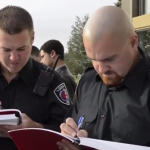 Students in the Provincial Offences class role play in full gear, providing a more realistic learning experience, with the help of uniforms donated by the Belleville Police Service and radios donated by TAS Communications.
Students in the Provincial Offences class role play in full gear, providing a more realistic learning experience, with the help of uniforms donated by the Belleville Police Service and radios donated by TAS Communications.





